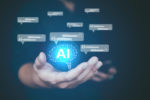
Visit Our Sponsors |
|
|
|
|
|
|
|
|
|
|
|
|
|
|
|
|
|
|
|
|
|
|
|
|
|
|
|
|
|
|
|
|
|
|
|
|
|
|
|
|
|
|
|
|
|
|
|
|
|
|
|
|
|
|
|
|
|
|
|
|
|
|
|

What exactly is artificial intelligence and machine learning for the supply chain? Firstly, definitions claiming that AI systems mimic human intelligence are inaccurate. AI systems, even connected with the internet of things, can’t absorb the environment around them and form new insights on their own. AI systems do recognize new patterns, but these are based on the limited data sets and auto-collection technologies that are put in place. Conversely, AI systems are able to codify their past experiences and improve systematically on past performance, whereas humans rely on their “organic” and often faulty memory.
Artificial intelligence is the umbrella term for many technologies, at the heart of which are an evolving set of algorithms and intelligent agents designed to discover patterns, learn, and create optimal insights, choices, and actions. AI today includes the broader set of data beyond traditional systems, often for inclusion in AI models. AI systems should maintain a history of their successes and failures to improve and self-correct for future recommendations and actions. Often, libraries of intelligent agents (that is, code) are available from the technology provider, or can be found in open-source libraries.
Machine learning is an application of AI that provides systems with the ability to automatically learn and improve from experience without being explicitly programmed. ML focuses on the development of computer programs that can access data and use it to learn for themselves. There are supervised and unsupervised learning modes within ML. A lot of the news these days is focused on the unsupervised learning stage. This is extremely useful for processing big and unstructured data, which is just beginning to be leveraged by supply-chain users.
AI and ML will be great supporting players, but don’t worry. AI will not take over your job. The fact is that humans are needed to train these systems, evaluate their findings and modify the models over time. AI cannot act alone.
However, AI and ML will change things. New insights will open the door to great opportunities, based on the learning generated by AI. Hence, to avoid digital displacement, employees have to prepare themselves now to be the leaders of using these capabilities, and the advisers to their companies based on the new insights.
The market has already changed for technology companies and professional jobs due to AI. These changes will continue to gain traction within supply chains in:
Outlook
The acquisition of AI technology companies with a good bench strength of data scientists has occurred, and will continue in 2020. AI and ML capabilities are being built into supply-chain software suites through organic development and partners’ source feeds. AI and ML-specific companies with practices in supply chain are growing in presence and traction in the market. Long term, though, AI and ML will be just another inclusion in the ever-growing smarts of our supply-chain technology application suites.
Ann Grackin is CEO of ChainLink Research.
RELATED CONTENT
RELATED VIDEOS
Timely, incisive articles delivered directly to your inbox.







